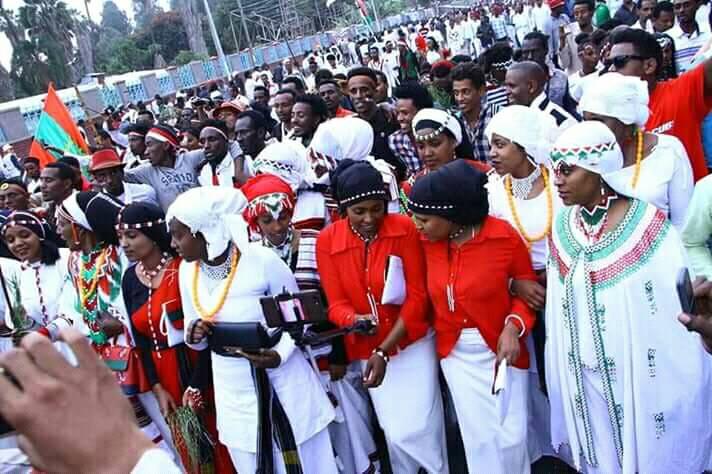
Owning a range of mesmerizing gorges, valleys, mountainous landscapes, lakes, astonishing water bodies, among others, Ethiopia has not so far been in a state of reaping the benefit it deserves out of all these natural and man-made assets through well exploiting the tourism sector. Undeniably, the country should device a number of mechanisms and takes a number of steps to make itself greater recipient out of the tourism sector.
Cognizant of the fact that Ethiopia is widely endowed with a number of tangible (The Lalibela Rock Hewn churches, Gondar Castle, Sof Omar Cave, Jimma Aba Jiffar Palace, many national parks) and intangible heritages (Meskel, Irreecha, Fiche Chembelala, Timket, Gifata etc.) that can potentially attract tourists and be source of foreign currency, The Ethiopian Herald had a stay with Mulualem Derese, a hotel and tourism expert working as a tour guide, to have a piece of information about the tie-up between the tourism sector and economic progress.
She said, “Our recklessness and spirit of overlooking what Ethiopia does have at hand has battered the nation a lot. There are many countries in the African continent and across the globe like for instance, Tunisia and Colombia, have converted what they have had into a spellbinding scenes thereby attracting tourists and reaping foreign currency from tourism. This means countries can benefit a lot from creativity and work hard even if they are devoid of tourist attraction sites and other potential income sources.”
According to Mulualem, not only is economic growth secured from manufacturing, industry and agriculture but it would be also out of the smokeless industry—Tourism. For instance, whenever people hear about agriculture, what automatically comes to their mind most of the time is the case of tilling or cultivating acres of land using oxen, horses or donkeys for the purpose of crop production.
However, agriculture incorporates a range of sectors like, apart from crop production and raising animals, Seri-culture, apiculture, aquaculture and poultry. As to her, Ethiopians have to think out of the obvious and business as usual trends to get their country prospered.
She further stated that mentioning the miraculous contribution of tourism to economic growth is not undermining the role of agriculture in bolstering the national economy as it has been considered as the mainstay of the national economy. However, this sector and others have to back one-another to well swell the economy of the nation. Religious and cultural tourists may peculiarly have different degrees of satisfaction with festivals/events because of the extent of other tourism motives. True, she said themed public celebrations, known as festivals, that explore and promote different aspects of local culture contribute significantly to the economic and social well-being of regions.
“Honestly speaking, it is shame and unfair to talk about poverty and unemployment in tourism resource rich nations like Ethiopia. Unless it is named otherwise and projected to lack of collaboration, hard work and weak tourism sector administration, no reason can be given to the low level of national revenue out of the tourism sector,” she opined.
According to Mulualem, the role of agriculture in the process of economic growth has framed a central question in development economics for several decades. As mechanisms through which agricultural productivity increases might contribute to structural change in the economy, it has long been theorized that advances in agriculture can promote shifts in labor to higher productivity sectors that offer higher real incomes.
When such a promising step is supported by a lucrative and harmless sector, the tourism one, the growth of the nation would undoubtedly be fueled right. Religious tourism is one of the oldest forms of tourism and plays an important part in the history of tourism development, she said.
She added that tourism is one of the world’s major industries, and people have been travelling for pleasure since the dawn of time. It has become one of the fastest expanding sectors of the global economy in recent years in general and Ethiopia and other developing nations in particular. Yes, she said tourism arose as a result of modernization and significantly contributed to shaping the experience of modernity.
Economic growth and tourism development are intertwined, according to her; therefore, an increase in the general economy will support tourism development. Additionally, according to Mulualem, tourism receipts have an upward link to Ethiopia’s economy and can thus aid in economic growth. Developing tourism business would foster economic growth over time, supporting the economy more than anticipated.
Some of the processes by which tourism contributes to socioeconomic development including creating jobs, decreasing unemployment rates, and introducing of new tax income streams, she added.
“The relationship between tourism spending and economic growth in Ethiopia and other nations of the Horn has been discovered as the two inextricably linked spheres. Tourism exerts a positive impact on economic growth. It also creates employment opportunities, enlarges the consumer markets, promotes export trade and generates foreign exchange earnings. As tourists usually spend more money in urban or cultural destinations as well as holidays, all the religious, cultural and other tangible and intangible heritages have to be well promoted and nurtured to excellently attract many more tourists across the globe,” she said.
As to her, more specifically, high-income countries’ growth is impacted by tourism to a larger positive degree than lower income countries’ growth is. This is due to the greater presence of tourism-related eco-system in high-income countries that could effectively attract inbound tourists, especially religious and cultural tourism subsectors.
Tourism undoubtedly creates jobs, strengthens the local economy, contributes to local infrastructure development and can help conserve the natural environment and cultural assets and traditions as well as reduce poverty and inequality, she opined.
“True, tourism helps culture in a few ways. One is through the support of artisans who sell their wares to visitors. Markets and shops are a draw to many tourists interested in souvenirs for people back home or as a way to remember their trip. Tourists also often visit cultural sites and watch religious rituals, local music, dance, theater, and other performances. These sustain intangible culture, which gives regional states their unique identity and protects the multiculturalism of Ethiopia,” she remarked.
According to Mulualem, people have to know how tourism affects the economy, climate change and culture. There are many benefits to traveling if a person is privileged enough to do it. Tourism boosts the revenue of the economy, creates thousands of jobs, develops the infrastructures of a country, and plants a sense of cultural exchange between foreigners and citizens. Tourism creates a cultural exchange between tourists and local citizens. Exhibitions, conferences, and events usually attract foreigners.
She further stated that not only are religious and cultural tourism a great opportunity for foreigners to learn about a new culture but they would also create many opportunities for local citizens. It also allows young entrepreneurs to establish new products and services that would not be sustainable on the local population of residents alone.
According to Mulualem, mass religious events like Meskel and Irrecha are often unprecedented tourist opportunity. “Religious tourism plays an important part in the history of tourism development. People visit religious sites with different motivations.”
As to her, the Ethiopian government increasingly uses cultural and religious festivals as a means to promote tourism and stimulate the regional economy due to the added value that festivals offer. The potential to reinforce local economies, encourage the conservation of festival-themed commodities, sustain and preserve local identities, and create opportunities for tourists to engage with local cultures and people.
Similarly, said Mulualem, folkloric beliefs, rituals, and ceremonies in Ethiopians’ tradition express deity reverence and have been practiced for several hundred years. From the perspective of a social-functional interpretation, an efficient religious festival also helps regional religions and cultural developments. The general acceptance of a religion stems from religious organizations and their followers, who claim that participation in religious activities is voluntary. True, festivals are a type of cultural event, highlighting the unique features of a destination or theme.
BY MENGESHA AMARE
THE ETHIOPIAN HERALD TUESDAY 3 OCTOBER 2023



